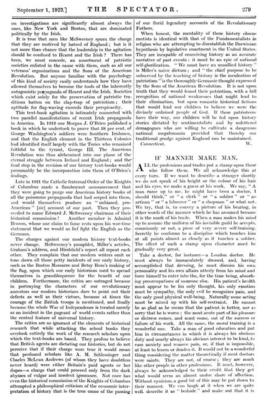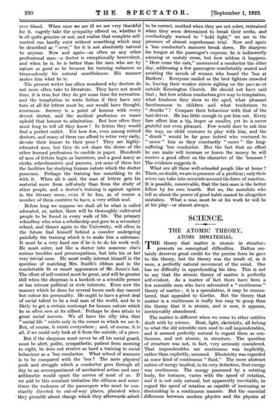IF MANNER MAKE MAN.
ALL the professions and trades put a stamp upon those who follow them. We GO acknowledge this at every turn. If we want to describe a stranger shortly we do not speak of his height or the colour of his hair and his eyes, we make a guess at his work. We say, "A man Came up to me, he might have been a doctor, l should think," or " a clerk" or " a soldier" or " an artisan" or" a labourer" or " a shopman " or what not. We try, that is, to convey a picture of his bearing, in other words of the manner which he has assumed because it is the mark of his trade. When a man makes his mind up to assume the uniform of his invisible guild he accepts, consciously or not, a piece of very severe self-training. Secretly he conforms to a discipline which touches him at all points almost as closely as it touches a soldier. The effect of such a stamp upon character must be gradually very great.
Take a doctor, for instance---a London doctor. He must always be immaculately dressed, and, having -accomplished that dressing, he must dismiss his own personality and his own affairs utterly from his mind and force himself to enter into the, for the time being, absorb- ing preoccupations of someone else. His patient's health must appear to be his only thought, his only emotion must be sympathy, the only evil he recognizes pain, and the only good physical well-being. Naturally some acting must be mixed up with his self-restraint. He cannot be as glad as he seems that the patient is better, nor as sorry that he is worse ; the most acute part of his pleasure or distress comes, and must come, out of the success -or failure of his work. All the same, the moral training is a wonderful one. Take a man of good education and put him in circumstances in which it is always his obvious duty and nearly always his obvious interest to be kind, to ease anxiety and remove pain, or, if that is impossible, at least to lessen or deaden it. It would not be a wonderful thing considering the matter theoretically if most doctors were saints. They are not, of course ; they arc much like other people in other professions. It must, however, always be acknowledged to their credit that they get what would seem an almost undue share of affection. Without cynicism, a good bit of this may be put down to their manner. We can laugh at it when we are quite well. describe it as " bedside " and make out that it is over bland. When once we are ill we are very thankful for it, eagerly take the sympathy offered us, whether it is all quite genuine or not, and realize that complete self- control can hardly exist without something which may be described as "over," for it is not absolutely natural to anyone. Now and again—as often as any other professional man—a doctor is exceptionally benevolent, and when he is, he is better than the men who are by nature as good as he because his training enhances so • tremendously his natural unselfishness. His manner makes him what he is.
The present writer has often wondered why doctors do not more often take to literature. They have not much time, it is true, but they do get some time for recreation, and the temptation to write fiction if they have any turn at all for letters must be, one would have thought, enormous. Secrecy is a point of honour with every decent doctor, and the medical profession en masse uphold that honour to admiration. But how often they must long to tell all they know ! In fiction they would find a perfect outlet. Yet how few, even among retired doctors, and many of them can afford to retire very early, devote their leisure to their pens ? They are highly- educated men, but they do not share the desire of the other learned professions to confide in paper. Hundreds of men of letters begin as barristers, and a good many as clerks, schoolmasters and parsons, yet none of these has the facilities for studying human nature which the doctor possesses. Perhaps the training has something to do with it. When all is said, the man of letters gets his material more from self-study than from the study of other people, and a doctor's training is against egoism in the literary sense, even if he has, as of course a number of them contrive to have, a very selfish soul.
• Before long we suppose we shall all be what is called educated, or, rather, there will be thoroughly cultivated people to be found in every walk of life. The primary schoolboy who wins a scholarship and goes to a secondary school, and thence again to the University, will often in the future find himself behind a counter undergoing painfully the training which is to make him a salesman. It must be a very hard one if he is to do his work well. He must enter, not like a doctor into someone else's serious troubles and preoccupations, but into his or her • very trivial ones. He must really interest himself in the question of matching Mrs. Smith's ribbon and in the comfortable fit or smart appearance of Mr. Jones's hat. The effort of self-control must be great, and will be greater still when the shopman is a bookish or a scientific person or has intense political or civic interests. Even now the manner which he dons for several hours each day cannot but colour his personality. He ought to have a great deal of social talent to be a real man of the world, and he is likely to get a certain contempt for human nature which he so often sees at its silliest. Perhaps he does attain to great social success. We all have the silly idea that "social life" exists only in the corner in which we see it. But, of course, it exists everywhere ; and, of course, it is all, if we could only look at it from the outside, of a piece.
But if the shopm an must never be off his social guard, • must be alert, polite, sympathetic, patient from morning to night, he does not receive so hard a training in social behaviour as a 'bus conductor. What school of manners is to be compared with the 'bus ? The mere physical push and struggle which a conductor goes through all • day to an accompaniment of mechanical action and easy - arithmetic would upset the nerves of most of us. If we add to this constant irritation the silliness and some- times the rudeness of the passengers who must be con- stantly directed to out-of-way places, placated when - they grumble about change which they afterwards admit to be correct, soothed when they, are not sober, restrained when they seem determined to break their necks, and everlastingly warned to "hold tight," we are in the presence of almost superhuman trial. Now and again a 'bus conductor's manners break down. He sharpens his tongue at the passenger's expense, he is indiscreetly amusing or _ unduly cross, but how seldom it happens. "Here come the cats," announced a conductor the other day, addressing a few passengers comfortably seated and awaiting the inrush of women who board the 'bus at Barkers'. Everyone smiled as the best fighters crowded in, leaving their weaker sisters sighing on the pavc m ;rit outside Kensington Church. He should not have said that ; but how seldom conductors give way to temptation, _what kindness they show to the aged, what pleasant facetiousness to children and what tenderness to " drunks " ! Compare their behaviour with that of the taxi-driver. He has little enough to put him out. Every fare offers him a tip, larger or smaller, yet he is never grateful nor even pleasant. Few would dare to ask him the way, no child ventures to play with him, and the " drunk " would be far gone indeed who ventured to " sauce " him as they constantly " sauce " the long- suffering 'bus conductor. Has the fact that no effort he can make will increase or lessen the money he will receive a good effect on the character of the 'busman ? The evidence suggests it.
What are all these well-schooled people like at home ? There, no doubt, we are in presence of a problem; only their wives can take into accurate account the force of reaction. It is possible, conceivable, that the taxi-man is the better fellow by his own hearth. But no, the moralists who tell us about the power of good habit cannot be altogether mistaken. What a man must be at his work he will be at his play—or almost always.



































 Previous page
Previous page